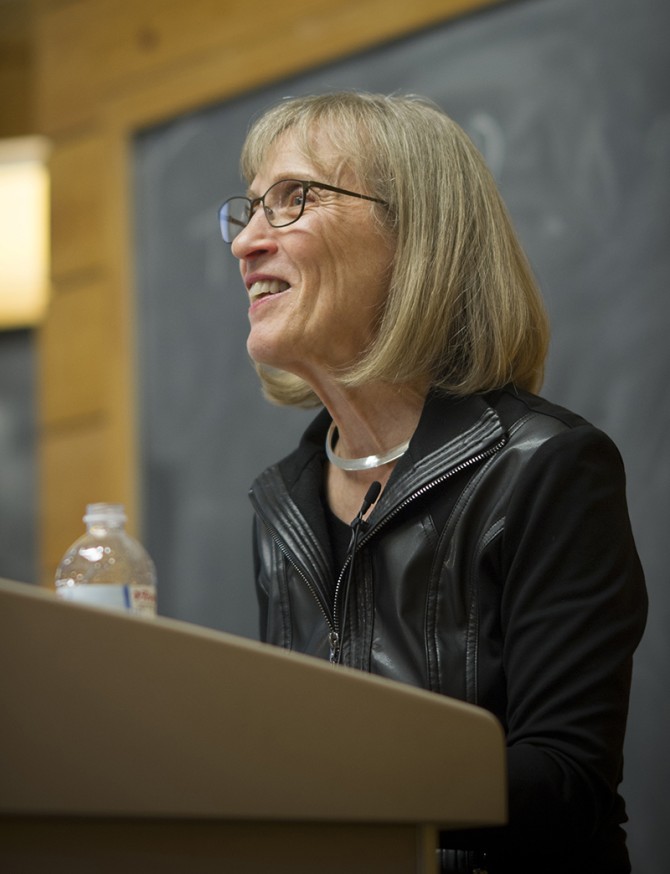Claudia Goldin ’67 wins Nobel Prize in Economics
By Blaine Friedlander, Cornell Chronicle
Claudia Goldin ’67, who dreamt of becoming an archaeologist or a microbiologist until she took an economics course at Cornell, won the 2023 Nobel Prize in Economics for her study of women’s progress in the workforce.
Goldin’s pioneering research has revealed the reasons for gender gaps in labor force participation and earnings. She is the third woman to win the economics Nobel, and the first to win it individually rather than sharing the prize. She is the Henry Lee Professor of Economics at Harvard University.
“Her research reveals the causes of change, as well as the main sources of the remaining gender gap,” the Royal Swedish Academy of Sciences said. “Women are vastly underrepresented in the global labor market and, when they work, they earn less than men. Claudia Goldin has trawled the archives and collected over 200 years of data from the U.S., allowing her to demonstrate how and why gender differences in earnings and employment rates have changed over time.”
Claudia Dale Goldin, 77, was born May 14, 1946, in the Bronx. As a child, she recalled visiting New York City’s Museum of Natural History where she fell in love with the mummies. She believed that she’d study archaeology; given her love for microscopes, she also thought about microbiology.
Until she went to Cornell, she never imagined majoring in economics in the College of Arts and Sciences.
“I decided to become an economist because I took an economics class from an amazing person named [Alfred] Kahn,” she said in a video filmed in 2020, hosted online by Cornell’s Department of Economics. Noted economist Alfred Kahn was known for theories that led to deregulating the airline industry in the late 1970s.
“He was so excited about the field of industrial organization and product markets and regulation, that it was infectious,” Goldin said. “And, in fact, when I went to graduate school at the University of Chicago, I went there to study industrial organization.”
An economic historian and a labor economist, Goldin’s research covers women in the labor force, the gender gap in earnings, income inequality, technological change, education and immigration.
Goldin’s influential papers have concerned women’s quest for career and family, higher education, women’s surnames after marriage as a social indicator, and the impact of contraception on women’s careers and marriage decisions.
Her most recent book, “Career & Family: Women’s Century-Long Journey toward Equity,” was published in 2021 by Princeton University Press.
Despite economic growth and rising proportions of employed women in the twentieth century, for a long period of time the earnings gap between women and men hardly closed, the Swedish academy said.
That’s because educational decisions, which impact a lifetime of career opportunities, are made at a relatively young age, Goldin said. If the expectations of young women are formed by the experiences of previous generations – for instance, mothers who went back to work after their children had grown up – then economic development will be slow, she found.
Thus, historically, Goldin said the gender gap in earnings could be explained by differences in education and occupational choices.
However, in today’s world, Goldin has shown that the bulk of an earnings difference for women in the same occupation largely arises from taking time to care for the birth of the first child, the academy said.
“Understanding women’s role in the labor is important for society,” said Jakob Svensson, chair of the Committee for the Prize in Economic Sciences. “Thanks to Claudia Goldin’s groundbreaking research, we now know much more about the underlying factors and which barriers may need to be addressed in the future.”
More than 50 Cornell alumni, faculty and visiting researchers have won Nobel Prizes for various subjects. They include: Pearl S. Buck ’25 in 1938 and Toni Morrison, M.S. ’55, in 1993 for literature; Barbara McClintock ’23, M.S. ’25, Ph.D ’27, for physiology or medicine in 1983; Hans Bethe in 1967 for physics; Roald Hoffmann, Frank H. T. Rhodes Professor Emeritus, in 1981 for chemistry; and Doug Osheroff M.S. ’71, Ph.D. ’73, and physics professors David Lee and Robert Richardson in 1996 for physics.
Media Contact
Get Cornell news delivered right to your inbox.
Subscribe

